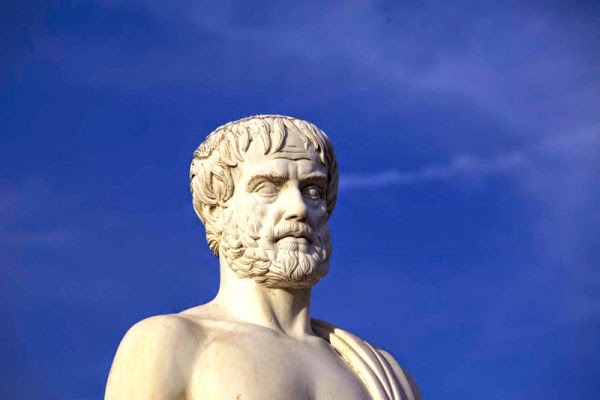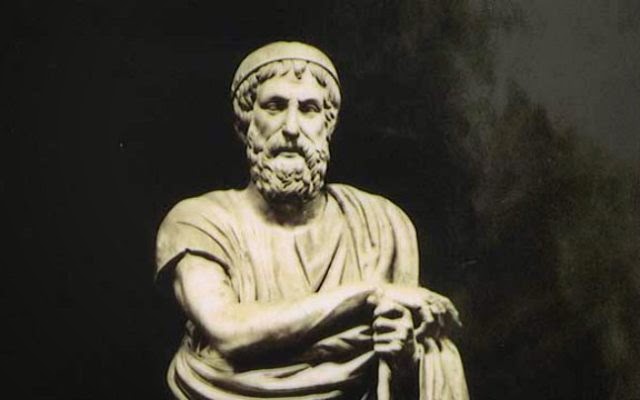The Massachusetts Institute of Technology (MIT) collected and analyzed historical data from around the world from 4000 BC to 2010 AD, in the context of Pantheon, a program that works under the responsibility of MIT's Media Lab.
According to MIT, someone is considered famous, if there is a Wikipedia's page with their name in more than 25 languages.
Here you can see the first 10 most famous people of the last 6,000 years.

Aristotle was born at Stagira in northern Greece in 384 B.C. His father, Nicomachus, was a physician at the court of Philip of Macedon, the father of Alexander the Great. In 367, Aristotle moved to Athens, which was the intellectual and cultural center of ancient Greece. He joined Plato's Academy in Athens and remained there until the age of thirty-seven. His writings cover many subjects – including physics, biology, zoology, metaphysics, logic, ethics, aesthetics, poetry, theater, music, rhetoric, linguistics, politics and government – and constitute the first comprehensive system of Western philosophy. Shortly after Plato died, Aristotle left Athens and, at the request of Philip of Macedon, tutored Alexander the Great between 356 and 323 BCE.

Plato was a classical Greek philosopher born 428-7 B.C.E and died in 348-7 B.C.E. Plato along with Socrates (his teacher) and Aristotle (his student) laid the fundamentals of Western philosophy. Along with being a mathematician he was a also a philosopher and a founder of an Academy in Athens, which was first institute which imparted higher end education to students. Socrates has a large influence of his thinking and teachings.

He could not be missing from the most famous people, since Jesus Christ set the basis for the construction of Christianity. He is the central figure of Christianity, whom the teachings of most Christian denominations hold to be the Son of God. Christianity regards Jesus as the awaited Messiah of the Old Testament and refers to him as Jesus Christ, a name that is also used in non-Christian contexts.

Socrates was a classical Greek philosopher credited as one of the founders of Western philosophy. He is an enigmatic figure known chiefly through the accounts of classical writers, especially the writings of his students Plato and Xenophon and the plays of his contemporary Aristophanes. Through his portrayal in Plato's dialogues, Socrates has become renowned for his contribution to the field of ethics, and it is this Platonic Socrates who lends his name to the concepts of Socratic irony and the Socratic method, or elenchus. The latter remains a commonly used tool in a wide range of discussions, and is a type of pedagogy in which a series of questions is asked not only to draw individual answers, but also to encourage fundamental insight into the issue at hand. Plato's Socrates also made important and lasting contributions to the field of epistemology, and the influence of his ideas and approach remains a strong foundation for much western philosophy that followed.

Conqueror and king of Macedonia, Alexander the Great was born on July 20, 356 B.C., in Pella, Macedonia. During his leadership, from 336 to 323 B.C., he united the Greek city-states and led the Corinthian League. He also became the king of Persia, Babylon and Asia, and created Macedonian colonies in the region. While considering the conquests of Carthage and Rome, Alexander died of malaria in Babylon, Persia (now Iraq), on June 13, 323 B.C.

Born on April 15, 1452, in Vinci, Italy, Leonardo da Vinci was concerned with the laws of science and nature, which greatly informed his work as a painter, sculptor, inventor and draftsmen. His ideas and body of work—which includes "Virgin of the Rocks," "The Last Supper," "Leda and the Swan" and "Mona Lisa"—have influenced countless artists and made da Vinci a leading light of the Italian Renaissance.

Kong Qui, better known as Confucius, was born in 551 B.C. in the Lu state of China. His teachings, preserved in the Analects, focused on creating ethical models of family and public interaction, and setting educational standards. He died in 479 B.C. Confucianism later became the official imperial philosophy of China, and was extremely influential during the Han, Tang and Song dynasties.

Gaius Julius Caesar was a Roman general, statesman, Consul, and notable author of Latin prose. He played a critical role in the events that led to the demise of the Roman Republic and the rise of the Roman Empire. In 60 BC, Caesar, Crassus, and Pompey formed a political alliance that was to dominate Roman politics for several years. Their attempts to amass power through populist tactics were opposed by the conservative ruling class within the Roman Senate, among them Cato the Younger with the frequent support of Cicero. Caesar's victories in the Gallic Wars, completed by 51 BC, extended Rome's territory to the English Channel and the Rhine. Caesar became the first Roman general to cross both when he built a bridge across the Rhine and conducted the first invasion of Britain.

Homer (700-800 BC), commonly credited as the Greek poet and author of Western Literature's first and most influential works Iliad (c. 750-725 BC) and its sequel Odyssey (c. 743-713 BC). For hundreds of years these two works of Homer, written in ancient formal Ionic Greek diction mixed with dialect, have been the subject of numerous translations and interpretations.

Pythagoras of Samos was an Ionian Greek philosopher, mathematician, and founder of the religious movement called Pythagoreanism. He was born on the island of Samos, and might have travelled widely in his youth, visiting Egypt and other places seeking knowledge. Around 530 BC, he moved to Croton, in Magna Graecia. Pythagoras made influential contributions to philosophy and religion in the late 6th century BC. He is often revered as a great mathematician, mystic, and scientist and is best known for the Pythagorean theorem which bears his name. It was said that he was the first man to call himself a philosopher, or lover of wisdom, and Pythagorean ideas exercised a marked influence on Plato, and through him, all of Western philosophy.
Related:
According to MIT, someone is considered famous, if there is a Wikipedia's page with their name in more than 25 languages.
Here you can see the first 10 most famous people of the last 6,000 years.
Aristotle

Aristotle was born at Stagira in northern Greece in 384 B.C. His father, Nicomachus, was a physician at the court of Philip of Macedon, the father of Alexander the Great. In 367, Aristotle moved to Athens, which was the intellectual and cultural center of ancient Greece. He joined Plato's Academy in Athens and remained there until the age of thirty-seven. His writings cover many subjects – including physics, biology, zoology, metaphysics, logic, ethics, aesthetics, poetry, theater, music, rhetoric, linguistics, politics and government – and constitute the first comprehensive system of Western philosophy. Shortly after Plato died, Aristotle left Athens and, at the request of Philip of Macedon, tutored Alexander the Great between 356 and 323 BCE.
Plato

Plato was a classical Greek philosopher born 428-7 B.C.E and died in 348-7 B.C.E. Plato along with Socrates (his teacher) and Aristotle (his student) laid the fundamentals of Western philosophy. Along with being a mathematician he was a also a philosopher and a founder of an Academy in Athens, which was first institute which imparted higher end education to students. Socrates has a large influence of his thinking and teachings.
Jesus Christ

He could not be missing from the most famous people, since Jesus Christ set the basis for the construction of Christianity. He is the central figure of Christianity, whom the teachings of most Christian denominations hold to be the Son of God. Christianity regards Jesus as the awaited Messiah of the Old Testament and refers to him as Jesus Christ, a name that is also used in non-Christian contexts.
Socrates

Socrates was a classical Greek philosopher credited as one of the founders of Western philosophy. He is an enigmatic figure known chiefly through the accounts of classical writers, especially the writings of his students Plato and Xenophon and the plays of his contemporary Aristophanes. Through his portrayal in Plato's dialogues, Socrates has become renowned for his contribution to the field of ethics, and it is this Platonic Socrates who lends his name to the concepts of Socratic irony and the Socratic method, or elenchus. The latter remains a commonly used tool in a wide range of discussions, and is a type of pedagogy in which a series of questions is asked not only to draw individual answers, but also to encourage fundamental insight into the issue at hand. Plato's Socrates also made important and lasting contributions to the field of epistemology, and the influence of his ideas and approach remains a strong foundation for much western philosophy that followed.
Alexander The Great

Conqueror and king of Macedonia, Alexander the Great was born on July 20, 356 B.C., in Pella, Macedonia. During his leadership, from 336 to 323 B.C., he united the Greek city-states and led the Corinthian League. He also became the king of Persia, Babylon and Asia, and created Macedonian colonies in the region. While considering the conquests of Carthage and Rome, Alexander died of malaria in Babylon, Persia (now Iraq), on June 13, 323 B.C.
Leonardo da Vinci

Born on April 15, 1452, in Vinci, Italy, Leonardo da Vinci was concerned with the laws of science and nature, which greatly informed his work as a painter, sculptor, inventor and draftsmen. His ideas and body of work—which includes "Virgin of the Rocks," "The Last Supper," "Leda and the Swan" and "Mona Lisa"—have influenced countless artists and made da Vinci a leading light of the Italian Renaissance.
Confucius

Kong Qui, better known as Confucius, was born in 551 B.C. in the Lu state of China. His teachings, preserved in the Analects, focused on creating ethical models of family and public interaction, and setting educational standards. He died in 479 B.C. Confucianism later became the official imperial philosophy of China, and was extremely influential during the Han, Tang and Song dynasties.
Julius Caesar

Gaius Julius Caesar was a Roman general, statesman, Consul, and notable author of Latin prose. He played a critical role in the events that led to the demise of the Roman Republic and the rise of the Roman Empire. In 60 BC, Caesar, Crassus, and Pompey formed a political alliance that was to dominate Roman politics for several years. Their attempts to amass power through populist tactics were opposed by the conservative ruling class within the Roman Senate, among them Cato the Younger with the frequent support of Cicero. Caesar's victories in the Gallic Wars, completed by 51 BC, extended Rome's territory to the English Channel and the Rhine. Caesar became the first Roman general to cross both when he built a bridge across the Rhine and conducted the first invasion of Britain.
Homer

Homer (700-800 BC), commonly credited as the Greek poet and author of Western Literature's first and most influential works Iliad (c. 750-725 BC) and its sequel Odyssey (c. 743-713 BC). For hundreds of years these two works of Homer, written in ancient formal Ionic Greek diction mixed with dialect, have been the subject of numerous translations and interpretations.
Pythagoras

Pythagoras of Samos was an Ionian Greek philosopher, mathematician, and founder of the religious movement called Pythagoreanism. He was born on the island of Samos, and might have travelled widely in his youth, visiting Egypt and other places seeking knowledge. Around 530 BC, he moved to Croton, in Magna Graecia. Pythagoras made influential contributions to philosophy and religion in the late 6th century BC. He is often revered as a great mathematician, mystic, and scientist and is best known for the Pythagorean theorem which bears his name. It was said that he was the first man to call himself a philosopher, or lover of wisdom, and Pythagorean ideas exercised a marked influence on Plato, and through him, all of Western philosophy.
Related:
- This Animation Will Explain To You Plato's Philosophy In Almost 3 Minutes
- MOTIVATION: 15 Best Socrates Picture Quotes
- Socrates: The Test Of Three
- Leonardo Da Vinci's Resume Written In The 1480s
- Leonardo Da Vinci’s 6 Ingenious Inventions
- One Buddha Teaching That Will Tell You More About Yourself Than Anything Else
- The Four Types Of Friends According To The Buddha
- 25 Life Changing Lessons to Learn from Buddha
- 25 Life Lessons from Albert Einstein
- Albert Einstein - How I See the World
- The 10 Inventions of Nikola Tesla That Changed The World
- 10 Unbelievable Facts You Didn't Know About Nikola Tesla
- Nikola Tesla The Secret Movie - Unlimited Free Energy Forever
- The Wisdom of Bruce Lee: 25 Quotes on Mastery, Martial Arts & Consciousness
- Mark Twain’s Top 9 Tips For Living A Kick-Ass Life
- It will take just 1 minute to read this and change your thinking.
- 8 Great Philosophical Questions That We’ll Never Solve
- 99 Interesting Quotes That Will Change How You See The World
- Workspaces Of Some Of The Greatest Artists Of The World (38 Pictures)












where is Mohammed??
ReplyDeleteMohammed should be on the top of list.
ReplyDeleteMohammed should be on the top of the child molesters list
DeleteThis is comical without Muhammed, like him or not. African, Asian, and European countries are influenced by him to this day. You guys "missed" this one. Smh
ReplyDeletethis is totally wrong way to see the most famous people.
ReplyDeleteMOHAMMED SHOULD BE ON THE TOP OF THE CHILD MOLESTERS LIST
ReplyDeleteMahammed like Alexander the Great are murderers.
ReplyDeleteGandhi, Marie Curie, Newton , Buddha are people who left something possitve behind.
Wake up from the religious dogma, set yourshelf free. Fear is not an option.
Too heavy on Greeks, and philosophers while ignoring others of great influence such as Isaak Newton, Albert Einstein, Mahatma Gandhi, Zoroaster, Gallileo, Curie, Mohammad, Gengis Khan, Mao Tse Tung, Buddha, and Lennin.
ReplyDeleteBetting odds allow you to calculate how much money you will win if you make a bet.
ReplyDeletesbobet88
Quite simply, for every value of B that you bet, you will win A, plus the return of your stake.
sbobet88
Decimals are far more common on exchanges, such as Betfair, but all leading betting sites do give you the option to view betting odds in this format.
sbobet88
They are an alternative to seeing betting odds in the fraction format, and in our opinion, are easier to work out.
sbobet88
Here is the calculation: winnings = (odds * stake) – stake. Let’s illustrate it with some examples.
sbobet88
In truth, one isn’t better than the other but there is certainly a trend emerging towards decimal odds.